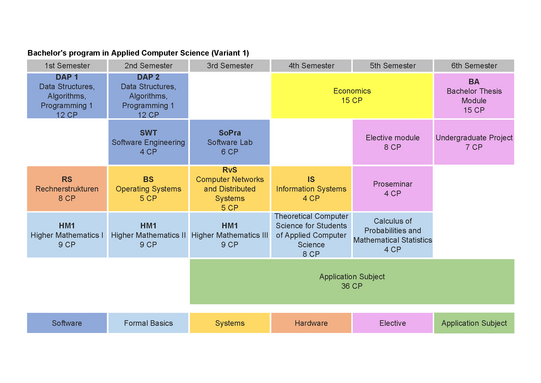Bachelor Applied Computer Science
The application-oriented Bachelor's degree course in Applied Computer Science offers you the opportunity to apply methodological knowledge of computer science in an engineering subject. In the first semesters, you will acquire important knowledge and skills that form the basis for the following courses and a successful professional life. The reduced elective area compared to the Bachelor's degree course in Computer Science allows you to focus more strongly on application areas of computer science.
The Bachelor's degree course in Applied Computer Science is a full-time, on-campus course with a standard period of study of six semesters (three years) and leads to a Bachelor of Science (B.Sc.) degree. It starts in the winter semester.
The course language is usually German. Here you will find courses that are (also) offered in English.
Directly to the application in the TU Dortmund University campus portal
Below is an sample study plan with its different modules. For Screenrader it contains an alternative text. You can find more study plans here.

In the Software Cycle courses, you will learn how to develop software. The spectrum ranges from creating small programs and investigating the efficiency of certain algorithms to developing larger projects in a team.
Many problems cannot be solved without an understanding of computer architecture. The engineering application subject complements this area.
You will learn about important computer science systems: Operating systems, computer networks, distributed systems and information systems (databases). They are part of every computer scientist's toolkit.
Computer science uses formal methods, which you learn in the mathematics and theory courses, to analyze and efficiently solve practical problems.
You choose a compulsory elective module from a large catalog of compulsory and elective modules according to your interests. In the proseminar, you will learn about scientific work on a topic that particularly interests you. The specialist project deals with challenging tasks that allow you to apply what you have learned so far in a team. This will prepare you for a successful Bachelor's thesis.
You will acquire business management skills through the economics modules.
As a computer scientist, you will apply your skills in an interdisciplinary way. You can choose the engineering application subject that prepares you for this according to your interests, e.g. electrical engineering, logistics, mechanical engineering, physics, robotics or an individual application subject that meets your expectations. Alternatively, you can choose the business-related application subject Enterprise Computing.
You will not only apply the knowledge gained in lectures in practice groups, but also in the internships integrated into the curriculum. In the software internship, you will work on challenging software projects in groups to gain valuable programming experience and skills such as teamwork and project management. The specialist project also involves challenging tasks that are worked on in a group.

![[Translate to English:] [Translate to English:]](/storages/zentraler_bilderpool/_processed_/d/f/csm_Informatik_275ba5e5fc.jpg)

![[Translate to English:] [Translate to English:]](/storages/zentraler_bilderpool/_processed_/1/b/csm_Figuren-nachdenklich_e2435967dd.jpg)
![[Translate to English:] [Translate to English:]](/storages/cs/_processed_/6/f/csm_teamwork1_e113f5f13b.png)
![[Translate to English:] [Translate to English:]](/storages/cs/_processed_/e/1/csm_header_ee496f74bf.png)